How to protect yourself against malware and phishing websites
What for: To keep your protection up to date.
By default, Firefox automatically checks for updates and installs these immediately upon availability — even if you are not using the browser. Developers consistently add new features and fix vulnerabilities, so it is important to use the latest version of the app. Make sure you have automatic update installation enabled on your smartphone (and in the background, too).
- Open Settings;
- Scroll down and open the App Store menu;
- In the Automatic Downloads section, enable Apps and App Updates.
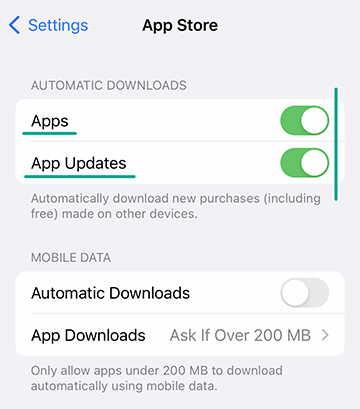
Downside: All apps, not just Firefox, will be updated automatically. It may use up a lot of your data plan.
What for: To stop websites from accessing your smartphone and browser capabilities.
Websites can request your permission to access various smartphone and browser capabilities, such as microphone, camera, location and notifications. Such access may help to improve website performance — for example, online stores may present special offers they have in your city and hide irrelevant ones. However, attackers may use these permissions to spy upon you. Check your list of permissions and revoke unnecessary ones from suspicious websites.
- Open Settings;
- Scroll down and go to the Firefox menu;
- Tap the permissions one at a time and select Never to deny access completely or Ask first to be able to give a one-time access permission if needed. Note that this menu only displays the capabilities that have already been requested by websites.
What for: To get rid of intrusive ads and messages.
By default, Firefox asks for permission to show pop-up windows if a site tries to open them. If these notifications bug you — or if you've granted the permission by mistake — turn off pop-ups for all websites in the settings.
- Tap the three-line button in the lower right corner of the screen;
- Select Settings;
- In the General section, enable Block Pop-up Windows.
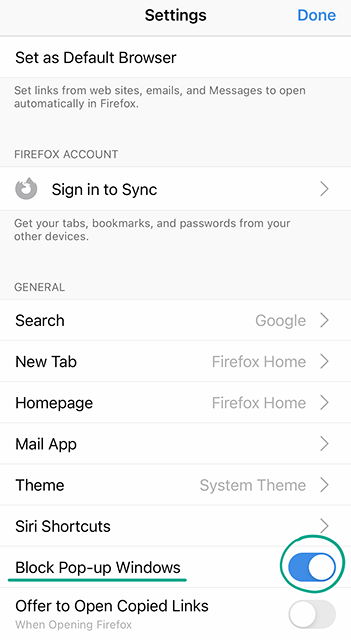
How to hide your data from prying eyes
What for: To leave no tracks.
Firefox normally stores data about the pages you open, the passwords you enter and other browser usage information. If you want to hide that information from whoever gains access to your smartphone or when using someone else's device, switch to private browsing:
- Tap the square in the bottom panel;
- Tap the mask icon in the lower left part of the screen to turn on private browsing mode;
- To open a new private tab, tap the plus icon on the right.
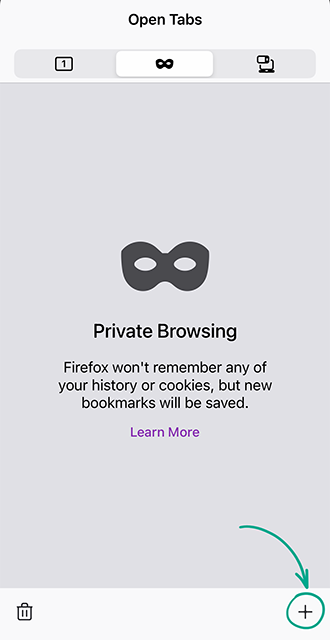
You may want to turn on Close Private Tabs in the Settings menu to have the browser delete your history automatically when you exit Private Browsing.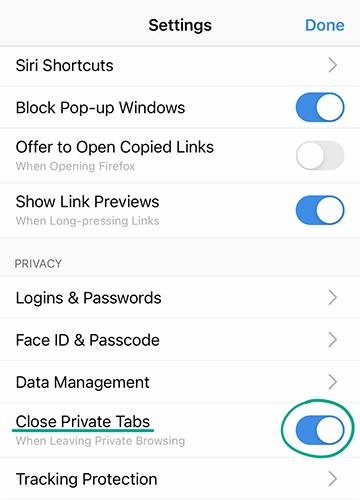
Keep in mind that private browsing only applies to data stored by the browser itself. Your Internet service provider or your employer (in case you are connected to an enterprise network) will be able to see what pages you have visited.
What for: So that strangers do not see traces of your activity.
By default, the new tab displays frequently visited and saved websites, as well as recently opened pages and your latest downloads. If you are in a public space, strangers might see those when you open a new tab. You can set up your browser to open a blank page when it starts or opens a new tab.
- In the General section, tap New tab;
- Select Blank Page in the window that opens.
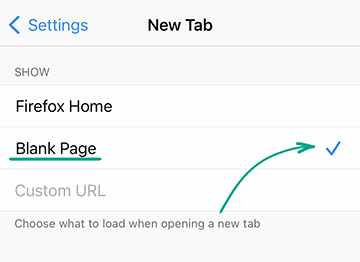
Downside: You will need to reopen all the websites you need to continue with every time you start the browser.
What for: To hide frequently visited websites from strangers.
When you type a request into the address or search bar, Firefox first suggests websites from your bookmarks, open pages, browsing history, and top websites. This helps locate your frequently visited websites faster, but someone near you can see them, too. To hide this information, disable search suggestions:
- Tap the three-line button in the lower right corner of the screen;
- Select Settings;
- Go to Search;
- Disable Show Search Suggestions.
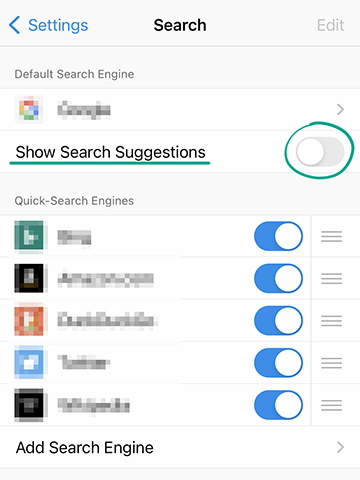
How to keep corporations out of your business
What for: To find a balance between privacy and comfort.
Website owners and advertising companies are eager to gather as much information about you as possible. To do this, they use various tracking tools, such as:
- Social media trackers — snippets of code that social networks post on their own and third-party websites. For example, Facebook might embed this type of code in the "share" button on a news portal to find out what websites you visit and track your interests.
- Cookies — small objects containing information about your system and page settings that the website saves on your device.
- Fingerprinters — scripts that record information about your browser and device, such as the screen resolution, system language, installed extensions and other settings.
- Other tracking elements — code snippets embedded in website content, such as banners, buttons, video players and other page elements.
Using the collected data, various companies create a unique profile of your device to remember your website settings and serve up targeted advertising.
Firefox blocks some of these scripts by default and prevents browser-based cryptominers — malicious objects that attackers use to make money at the expense of your device's resources without your permission — from running.
You can turn on a stricter protection mode to further thwart surveillance or customize the protection to meet your needs.
- Tap the three-line button in the lower right corner of the screen;
- Select Settings;
- Go to the Privacy section and tap Tracking Protection.
- Select the level that best suits you:
- Standard (default). Firefox will block social media trackers, cross-website cookies, fingerprinters and cryptominers on all open pages. It will also block other trackers, but only in private browsing windows.
- Strict. Firefox will block social media trackers, cross-website cookies, fingerprinters, cryptominers and other trackers on all pages.
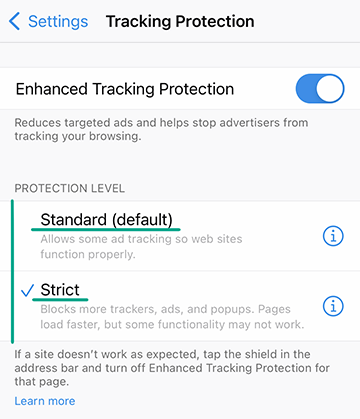
Bear in mind that blocking all cookies and trackers can stop some Web pages from functioning properly. Disable tracking prevention for such Web pages if you are sure they are safe:
- Tap the shield icon to the left of the address bar;
- In the drop-down menu, disable Enhanced Tracking Protection.

What for: To stop Firefox developers from gathering extra information about you.
Firefox may collect information about the pages you visit, as well as browser technical data and other information. The developers declare they use such data to improve the app and fix bugs. However, it means that data about your browsing will be stored on the company's servers. If you want to avoid it, turn off data collection:
- Tap the three-line button in the lower right corner of the screen;
- Select Settings;
- Scroll down to the Support section and turn off Send Usage Data.
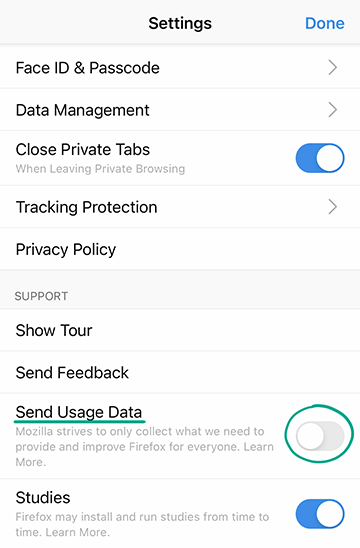
What for: To stop the browser developers from storing your online activity information on their servers.
Firefox can sync your browsing history, passwords, bookmarks and other data between devices where you log in to the browser account. For example, when you bookmark a website on your computer, you'll be able to find it among favorites on your smartphone. To enable this, the browser saves your personal information on the company servers, including your browsing history, the tabs you have open, URLs, and other information. To avoid that, turn off the syncing.
- Tap the three-line button in the lower right corner of the screen;
- Select Settings;
- Tap your account icon above the menu;
- Tap Disconnect Sync and confirm your selection.
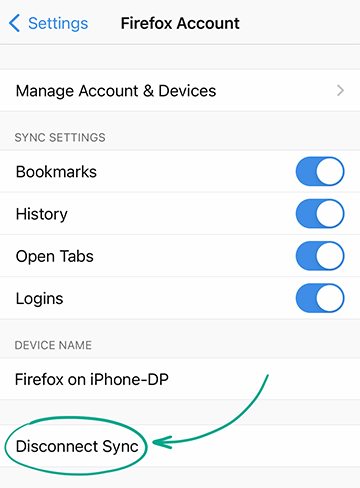
This will stop the browser on the device from syncing information, but you will have to deactivate sync separately on other devices.
Downside: You will only have access to saved passwords, bookmarks and other data from the device where you save them.
What for: To keep search giants from gathering information about you.
Most search engines, such as Google or Bing, store user information and queries. This allows these companies to show customized search results and promote their services. However, some engines — such as DuckDuckGo — do not collect any such data. If you prefer to stay anonymous, you can assign this service as the default search engine.
- Tap the three-line button in the lower right corner of the screen;
- Select Settings;
- Go to Search;
- Tap Add Search Engine;
- Enter DuckDuckGo in the Title field, and https://duckduckgo.com/?q= in the URL field;
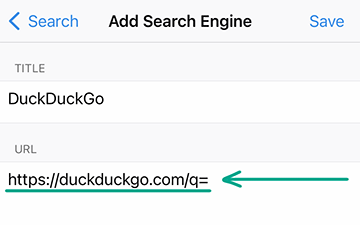
- Tap Save;
- In the Search section under Default Search Engine, tap the name of the current search engine and select DuckDuckGo from the list.
How to protect your data
What for: To keep attackers from using your stored passwords.
When you sign in to a website, Firefox prompts you to save your login and password. Next time you visit the website, the browser will automatically fill in your credentials. However, if someone else gains access to your smartphone, they can log in to your account.
To protect your accounts, set a passcode. The browser will request it when it opens and every time you access your data.
To set a passcode:
- Tap the three-line button in the lower right corner of the screen;
- Select Settings;
- Go to Face ID & Passcode;
- Select Turn Passcode On;
- Set a strong and unique passcode and remember it. If you forget it, you will be able to reset it, but that will remove all data stored in the browser.
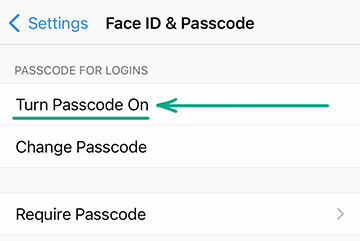
Downside: Every time you start Firefox or view and change stored data, you will need to enter the passcode.
What for: To prevent account hijacking.
When you sign in to a website, Firefox prompts you to save your login and password. Next time you visit the website, the browser will automatically fill in your credentials. However, stored passwords can fall prey to leaks. To be on the safe side, disable autofill and remove stored passwords from the browser:
- Tap the three-line button in the lower right corner of the screen;
- Select Settings;
- Go to the Logins & Passwords section;
- Disable Save Logins;
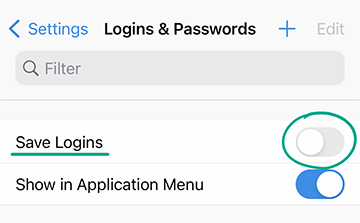
- To delete all previously saved passwords, tap Edit in the upper right corner of the screen, then tap Select All at the bottom and Delete in the upper right corner;
- Confirm your choice.
Downside: You will have to manually enter logins and passwords every time you sign in.
You can avoid the inconvenience and improve the security of your accounts using a password manager. Unlike a browser, it does not access third-party resources on the Web, which means it is protected from malicious websites. Moreover, it cannot be hacked through a vulnerable extension or plug-in, while browsers can.







